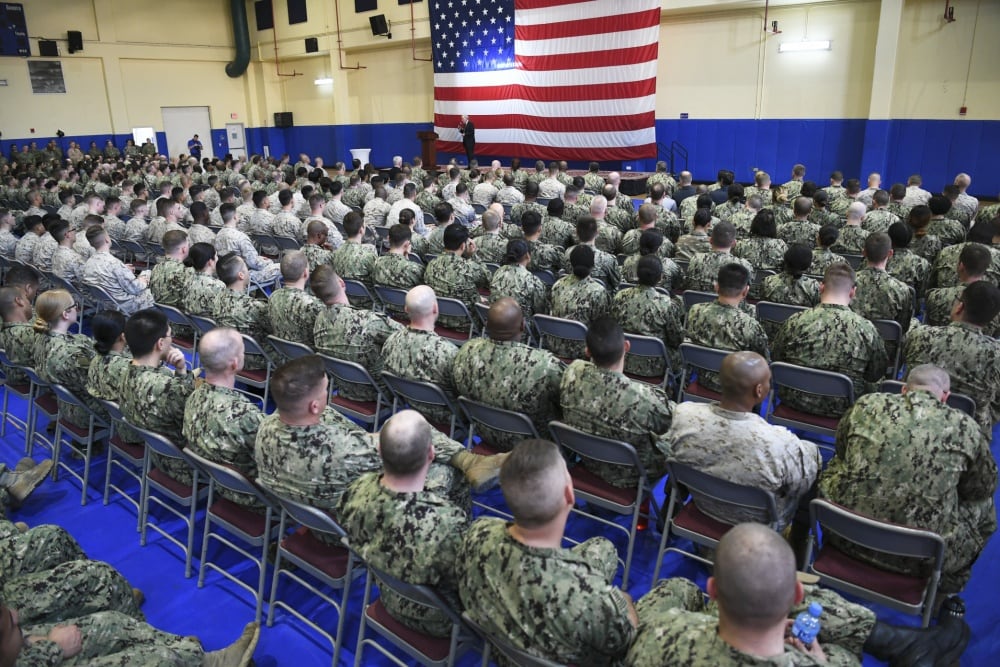While the Naval Criminal Investigative Service investigated numerous sailors for crimes involving sex trafficking and prostitutes in Bahrain in recent years, Navy prosecutors have struggled at times to win criminal convictions in court.
The Navy filed charges against at least nine sailors for such offenses in 2017 and 2018, including one mid-grade officer and five chiefs. The charges included allegations that some sailors were trafficking or attempting to traffic Thai prostitutes into Bahrain and housing them in their off-post apartments with the intention of taking a cut of their nightly cash earnings.
Navy prosecutors secured guilty pleas in five of those nine cases, but officials concede that they offered watered-down plea deals to some of the accused sailors due to a recurring problem: the failure to get the Thai prostitutes at the center of the cases into a military courtroom to testify.
Several cases hinged on the cooperation of these victimized women, and the Navy’s prosecutions collapsed when the women fell off the Navy’s radar or they otherwise refused to cooperate, leaving prosecutors without key witnesses at trial.
Navy Times contacted several anti-trafficking and advocacy groups both in the United States and Thailand to learn more about the life of Thai prostitutes in Bahrain. All professed ignorance of the situation or declined to comment.
RELATED

Attempts to contact the women at the center of the cases were also unsuccessful.
The women’s reluctance is unsurprising in a way, according to service officials.
Such women in Bahrain are there illegally, NCIS officials testified, and were both unfamiliar with and distrustful of the American military justice system.
“We’re not talking about you in the United States of America -- we’re talking about Thai prostitutes in Bahrain,” one Navy prosecutor, Lt. Cmdr. Keven Schreiber, told a Navy judge during a court hearing, as he explained why women who had levied allegations against U.S. sailors were not available to take the stand.
The women exist “in a weird status in Bahraini society and law,” Schreiber said.
“What would be reasonable for them to do?” he asked.

Lin Raiwest, an NCIS informant and Thai prostitute who was well-known to many U.S. sailors in Bahrain and who was at the center of several Navy investigations, told her NCIS handlers that the women sometimes travel to Bahrain under a false alias so their families wouldn’t find out, according to court records.
They often lived in crowded apartments and went without medical care while selling sex to sailors in Bahrain so that they could make money to send home to their families in Thailand.
Sailors told NCIS agents that the women coming from Thailand to Bahrain arrived there indebted and indentured to their mamasan — the local term for female pimps who manage sex workers, helping to arrange their clients and taking a cut of earnings at night’s end.
The women are essentially indentured until they pay off their debt, according to NCIS records.
RELATED

Bahrain officials did not respond to numerous calls and requests for comment for this story.
Defense attorneys in several cases acknowledged the challenges the Navy faced in getting these marginalized women to testify.
Brian Pristera, a civilian defense attorney, represented a chief petty officer who was acquitted in 2018 on an obstruction of justice charge stemming from the NCIS investigations in Bahrain. He was privy to several of the cases involving Thai prostitutes and he suspects that living in the shadows of Bahraini society made it harder to get those women on the stand.
“The Navy has had a difficult time dealing with witnesses…who are transient, who are not local and who are very skeptical of the justice process,” he told Military Times. “They’re not fluent in [English], they don’t understand our processes and it makes it complicated to involve them in the justice system.”
Raiwest was a confidential NCIS informant from 2014 to 2018, even as she continued working as a prostitute and also as a local mamasan, Navy court records show.
She told Navy prosecutors that she would testify in several cases, but later disappeared according to court records.
Navy officials declined to comment on why some prosecutions sputtered, but court records show several cases in which Raiwest was a central witness later resulted in acquittals or plea deals on lesser charges for sailors accused of crimes.
“It begs the question of — what is the Navy getting out of these informants when they’re so unreliable, they’re so unpredictable and so unavailable for the military justice process?” Pristera said. “You’ve got four years of a mamasan informing and working with NCIS, and you’ve got the end result today as a number of acquittals and trials that resulted in either reduced charges or no charges at all.”
A Navy official familiar with the cases acknowledged the difficulties.
“Holding sailors accountable at court-martial for conduct involving this population of vulnerable foreign nationals will continue to be a challenge,” said the official, who spoke on condition of anonymity because the Navy did not authorize them to speak on the matter.
Overseas, the U.S. government could not compel these women to testify.
RELATED

“Many of these women made the choice not to participate, or simply vanish,” the official said. “In the same way victims of sexual assault feel shame or remorse and choose not to report…persons who are victims of sex and labor trafficking are often reluctant to participate in prosecutions.”
The challenge of holding sailors accountable and winning convictions in court was further complicated by the fact that NCIS and Navy attorneys had little experience with sex trafficking prosecutions and had to seek counsel from the U.S. Department of Justice during some proceedings, according to court records obtained by Military Times.
“I’ll admit it was really important in the early stages of the panoply of cases that involved these topics, there was a lot of discussion about how we charge these cases, about what laws apply, about what the standards of proof and the elements might be,” Schreiber told the court in 2018.
To read the full Tinder, Sailor, Hooker, Pimp story, visit: http://militarytimes.com/bahrain-scandal
Watch all five parts of the video series:
Part 1: “They do sex and make u money”
Part 2: The Informant
Part 3: “She tried to fight”
Part 4: “She came to my room”
Part 5: “Unacceptable”
Geoff is the managing editor of Military Times, but he still loves writing stories. He covered Iraq and Afghanistan extensively and was a reporter at the Chicago Tribune. He welcomes any and all kinds of tips at geoffz@militarytimes.com.





